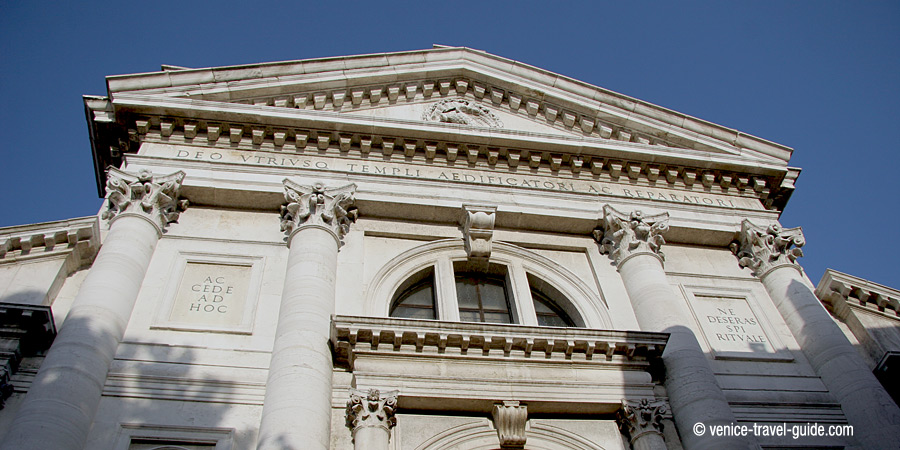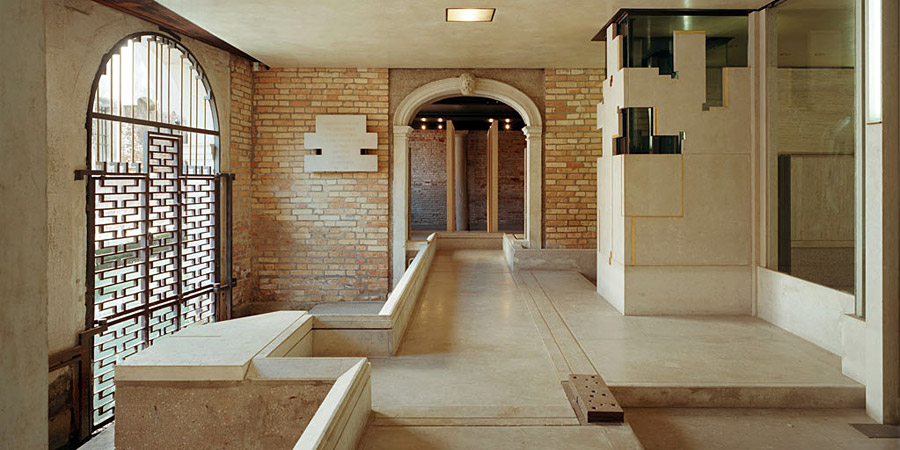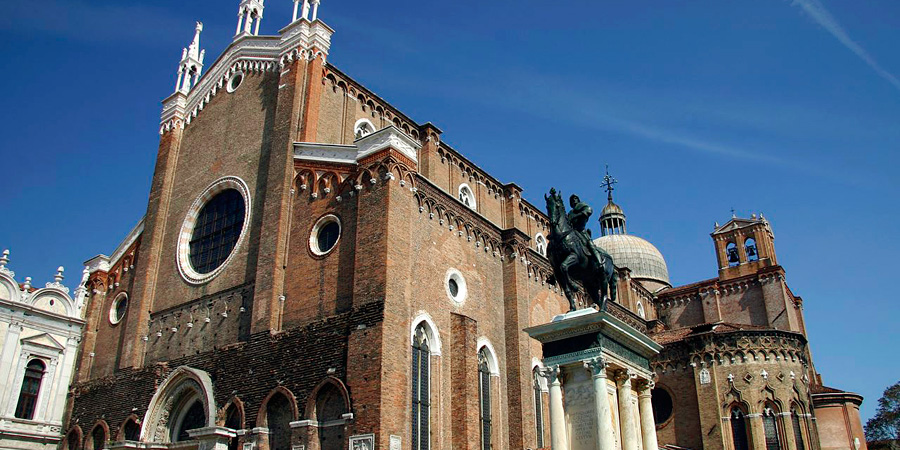The sestiere of Castello was one of the earliest parts of Venice to be settled (fifth to sixth centuries). The district takes its name from the castle that stood there and which provided defence from attacks from the sea. Here is the ancient Arsenal, that was an essential part of the life of the repubblica.
Cathedral of San Pietro di Castello

For many centuries the Basilica di San Pietro di Castello was under the authority of the Patriarch of Grado. In 1451 Venice obtained its own patriarch, hence the church became cathedral. It is located at the north-eastern edge of the city of Venice near the Arsenale. The campanile (1463) was damaged by a fulmine, and rebuilt in 1482 by Codussi.
After religious institutions were suppressed by Napoleon in 1807, Saint Mark became the new cathedral and instead of just being a chapel of the Doge's it became the seat of the Patriarch.
Arsenale

The Arsenale can be recognised by its terracotta walls and squares towers. From the thirteenth century it was an essential part of the life of the Venetian Republic. The Arsenal of Venice is a very large part of the island city and was the heart of the Venetian naval industry from the twelfth century until the end of Republic.
It is linked to the most flourishing period of the life of the Serenissima: thanks to the impressive ships built here, Venice was able to counteract the Turks in the Aegean Sea and conquer the northern European routes. Today it is one of the venues of the Biennale.
Historical Naval Museum

The Museo Storico Navale is a museum owned by the Navy, located at the Arsenal, and exibits relate the naval history of the Venetian Republic. The main building contains artistic and historical objects related to the history of the Italian navy distributed in 42 exhibition halls on a total of five floors.There are numerous models of venetian ships.
They are part of the museum the "Hall of Ships" workshop of the oars in the ancient Arsenale and the church of San Biagio, an ancient place of worship of the Venetian navy.
Church of San Francesco della Vigna

The Chiesa di San Francesco della Vigna was built on a vineyard donated to the Franciscans by marco Ziani, the son of the Doge Pietro in 1253. That is why it is still called san Francesco della Vigna (vigna meaning vineyard). The church was rebuilt to a design by Jacopo Sansovino, although the elegant façade is by Andrea Palladio.
The interior of the church has a simplicity and severity befitting a Franciscan church, with plain Istrian marble Doric pilasters. The choir, which in the past was occupied by the monks during services, is behind the altar. The interior contains an alabaster sculpture of St. Louis of Toulouse, and an early 15th-century Gothic painting of the Madonna of humility.
Church of San Giovanni in Bragora

The Chiesa di San Giovanni in Bragora stands in the campo of the same name which is surrounded by old palazzi. The church was originally built in the eighth century and was founded by San Magno, the bishop of Oderzo. The inside of the church is still in the form of a Basilica, and has three naves and a Gothic trussed ceiling.
Pietro Barbo, future Pope Paul II, and Antonio Vivaldi were baptised in the church. The current appearance dates from the last renovation (1475-1505).
Church of Pietà

The Chiesa della Pietà or Santa Maria della Visitazione was rebuilt in the eighteenth century by the architect Giorgio Massari. The church is so named because it is located next to the old orphanage located in Calle della Pietà, where during the seventeenth century lent his work Antonio Vivaldi. The musician directed a choir of young orphans.
On the exterior of the church is a plaque of 1548, which threatens curses and anathemas imposed by God himself, against those who abandoned their children in the orphanage near the Pieta even if they had the means to maintain them.
School and Church of San Giorgio dei Greci

The Chiesa di San Giorgio dei Greci, near the church of San Zaccaria, is used as the Cathedral by the Orthodox Archdiocese of Italy but belongs to adjacent Hellenic Institute. In 1526 the Greek Community in Venice was second only to that of the Jews, and obtained permission from the Patriarch to hold Greek Orthodox services.
This houses a collection of liturgical art and precious Byzantine icons. A part of the collection is housed in the istituto Ellenico di Studi Bizantini e Post-Bizantini.
Church of San Zaccaria

Originally, the Chiesa di San Zaccaria was a Benedictine nunnery next to it. The nunnery was reserved for young Patrician novices, even if they had no vocation. As it belonged to the Benedictine order the rules were fairly lax. The church was founded in the ninth and was renovated several times in different architectural styles that can still be seen today.
The belltower dates back to the ninth century. The most important work was carried out in 1458 and culminated in the impressive façade by Mauro Codussi.
Church of Santa Maria Formosa

Legend has it that San Magno ordered it to be built. The Chiesa di Santa Maria Formosa was rebuilt in the eleventh century and was then rebuilt on the previous foundations in 1492, although the original layout in the shape of a Greek cross was mantained. The church is in one of the finest of Venice's squares.
It is surrounded by private palaces from different periods, as can be seen from architectural styles of their façades.
Fondazione Querini Stampalia

The Fondazione Querini Stampalia is a cultural foundation based in Palazzo Querini Stampalia, was commissioned in 1868 by Giovanni Querini Stampalia who died the following year without direct heirs. The palace has a great work of restoration by the architect Carlo Scarpa between 1961 and 1963.
The foundation has a library, a museum and an area for temporary exhibitions. The museum houses ancient furnishings and paintings of great value.
Basilica dei Santi Giovanni e Paolo

The Basilica dei Santi Giovanni e Paolo, built in 1368, is a fine Gothic building with a basilica and 5 Gothic apses. it is venice's Pantheon because it holds the tombs of twenty-five doges, great commanders and famous men of the Venetian Republic, whose remains are housed in fine tombs. In addition, there are numerous works of art.
A large polyptych by Giovanni Bellini decorates the altar by Vincenzo Ferrer, and an altar-piece by Lorenzo Lotto displays the alms of Saint Anthony.



